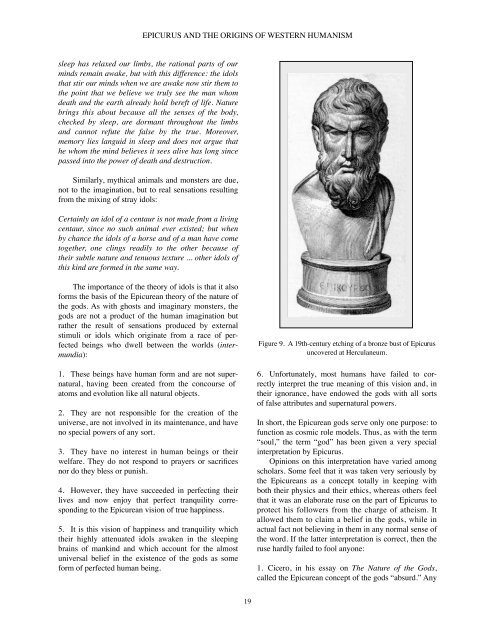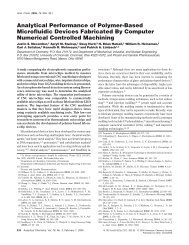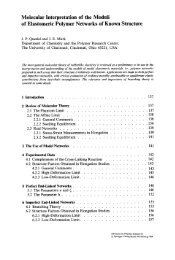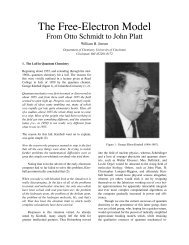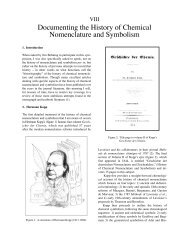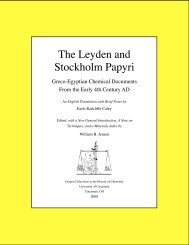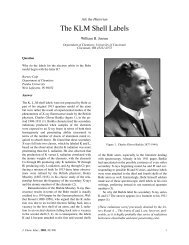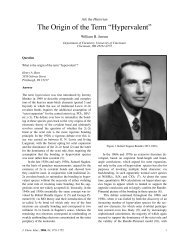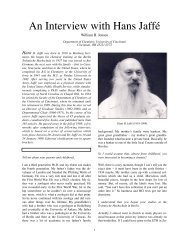Frankenstein's Cat.pdf - University of Cincinnati
Frankenstein's Cat.pdf - University of Cincinnati
Frankenstein's Cat.pdf - University of Cincinnati
You also want an ePaper? Increase the reach of your titles
YUMPU automatically turns print PDFs into web optimized ePapers that Google loves.
EPICURUS AND THE ORIGINS OF WESTERN HUMANISM<br />
sleep has relaxed our limbs, the rational parts <strong>of</strong> our<br />
minds remain awake, but with this difference: the idols<br />
that stir our minds when we are awake now stir them to<br />
the point that we believe we truly see the man whom<br />
death and the earth already hold bereft <strong>of</strong> life. Nature<br />
brings this about because all the senses <strong>of</strong> the body,<br />
checked by sleep, are dormant throughout the limbs<br />
and cannot refute the false by the true. Moreover,<br />
memory lies languid in sleep and does not argue that<br />
he whom the mind believes it sees alive has long since<br />
passed into the power <strong>of</strong> death and destruction.<br />
! Similarly, mythical animals and monsters are due,<br />
not to the imagination, but to real sensations resulting<br />
from the mixing <strong>of</strong> stray idols:<br />
Certainly an idol <strong>of</strong> a centaur is not made from a living<br />
centaur, since no such animal ever existed; but when<br />
by chance the idols <strong>of</strong> a horse and <strong>of</strong> a man have come<br />
together, one clings readily to the other because <strong>of</strong><br />
their subtle nature and tenuous texture ... other idols <strong>of</strong><br />
this kind are formed in the same way.<br />
! The importance <strong>of</strong> the theory <strong>of</strong> idols is that it also<br />
forms the basis <strong>of</strong> the Epicurean theory <strong>of</strong> the nature <strong>of</strong><br />
the gods. As with ghosts and imaginary monsters, the<br />
gods are not a product <strong>of</strong> the human imagination but<br />
rather the result <strong>of</strong> sensations produced by external<br />
stimuli or idols which originate from a race <strong>of</strong> perfected<br />
beings who dwell between the worlds (intermundia):<br />
1. ! These beings have human form and are not supernatural,<br />
having been created from the concourse <strong>of</strong><br />
atoms and evolution like all natural objects.<br />
2.! They are not responsible for the creation <strong>of</strong> the<br />
universe, are not involved in its maintenance, and have<br />
no special powers <strong>of</strong> any sort.<br />
3.! They have no interest in human beings or their<br />
welfare. They do not respond to prayers or sacrifices<br />
nor do they bless or punish.<br />
4.! However, they have succeeded in perfecting their<br />
lives and now enjoy that perfect tranquility corresponding<br />
to the Epicurean vision <strong>of</strong> true happiness.<br />
5.! It is this vision <strong>of</strong> happiness and tranquility which<br />
their highly attenuated idols awaken in the sleeping<br />
brains <strong>of</strong> mankind and which account for the almost<br />
universal belief in the existence <strong>of</strong> the gods as some<br />
form <strong>of</strong> perfected human being.<br />
Figure 9. A 19th-century etching <strong>of</strong> a bronze bust <strong>of</strong> Epicurus<br />
uncovered at Herculaneum.<br />
6.! Unfortunately, most humans have failed to correctly<br />
interpret the true meaning <strong>of</strong> this vision and, in<br />
their ignorance, have endowed the gods with all sorts<br />
<strong>of</strong> false attributes and supernatural powers.<br />
In short, the Epicurean gods serve only one purpose: to<br />
function as cosmic role models. Thus, as with the term<br />
“soul,” the term “god” has been given a very special<br />
interpretation by Epicurus.<br />
! Opinions on this interpretation have varied among<br />
scholars. Some feel that it was taken very seriously by<br />
the Epicureans as a concept totally in keeping with<br />
both their physics and their ethics, whereas others feel<br />
that it was an elaborate ruse on the part <strong>of</strong> Epicurus to<br />
protect his followers from the charge <strong>of</strong> atheism. It<br />
allowed them to claim a belief in the gods, while in<br />
actual fact not believing in them in any normal sense <strong>of</strong><br />
the word. If the latter interpretation is correct, then the<br />
ruse hardly failed to fool anyone:!<br />
1.! Cicero, in his essay on The Nature <strong>of</strong> the Gods,<br />
called the Epicurean concept <strong>of</strong> the gods “absurd.” Any<br />
19


